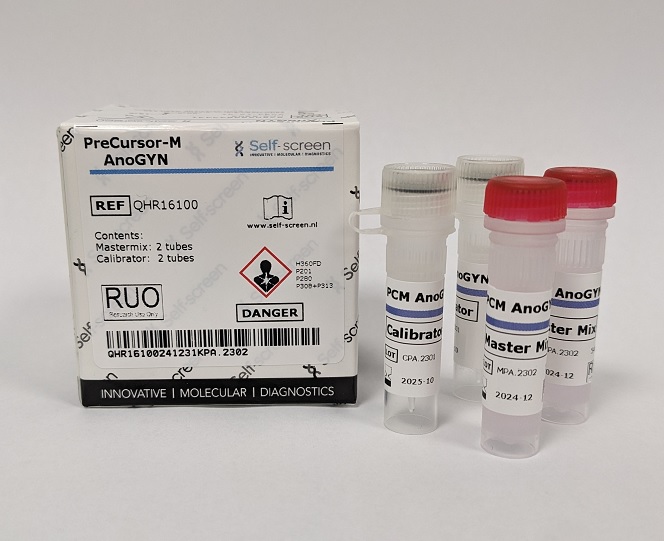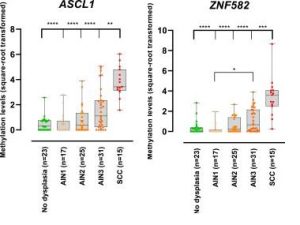PreCursor-M AnoGYN
Similar to cervical cancer, the human papillomavirus (HPV) is responsible for the majority of anal cancers. The incidence of anal cancer is currently increasing significantly (an up to 3-fold increase over the past few years), especially observed in several specific at-risk-populations such as:
- Women diagnosed with HPV -related gynecological (pre)cancer
- Men who have sex with men (MSM)
- Recipients of organ transplants
- People carrying HIV
- Immune compromised patients
It is because of this development that international communities are discussing active screening for and treatment of anal cancer in such at-risk groups.
Methylation appears to be promising for future use as an accurate biomarker for objective risk stratification of anal lesions.

PreCursor-M AnoGYN Methylation Assay (RUO)
Self-screen has therefore developed the PreCursor-M AnoGYN Methylation Assay (RUO). This assay identifies the hypermethylation levels of two genes, ASCL1 and ZNF582, respectively in anal specimens. With the ACTB reference gene, the PreCursor-M AnoGYN is developed as a multiplex quantitative methylation specific PCR on the RotorGeneQ (QIAGEN), Mic (Biomolecular Systems) and ViiA7 (ThermoFisher) cyclers.
In a cross-sectional study on a series of anal biopsies, covering all stages of anal disease, the assay demonstrates a diagnostic performance of AIN3+ of 0.81. ASCL1 and ZNF582 methylation levels increased with increasing severity of disease.

All cancers and virtually all progressive high-grade anal intraepithelial neoplasia lesions were detected at 70% and 80% specificity. Also the PreCursor-M AnoGYN RUO methylation test demonstrates to be highly robust and reproducible.
In conclusion PreCursor-M AnoGYN RUO shows an excellent diagnostic accuracy to detect AIN3+ and can potentially be used as valuable biomarker for detection of anal (pre-)cancer and to guide high-grade anal intraepithelial neoplasia (HSIL) management.
PreCursor-M AnoGYN literature and studies
Rozemeijer e.a., Tumour Virus Res. 2024 – Analytical validation and diagnostic performance of the ASCL1/ZNF582 methylation test for detection of high-grade anal intraepithelial neoplasia and anal cancer
Handbooks
For any questions, contact Self-screen at info@self-screen.nl

